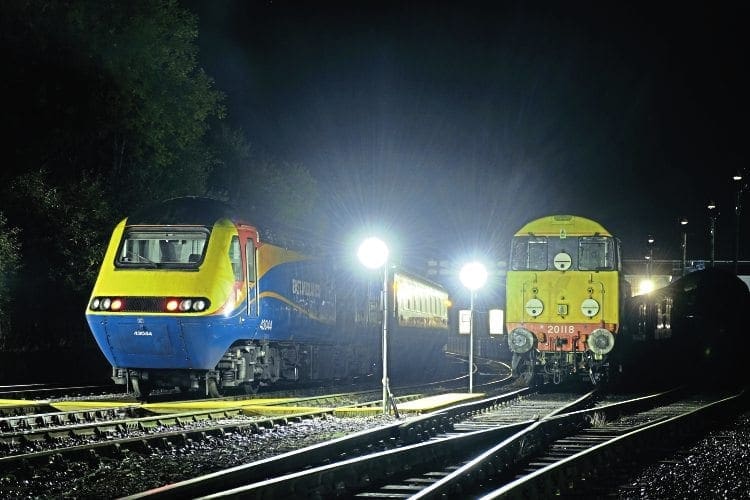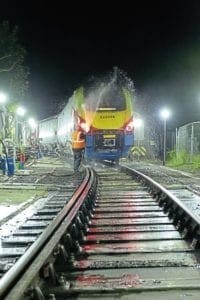For 79 days between July and October, East Midlands Trains used Barrow Hill as a temporary depot, servicing HSTs and ‘Meridians’ during the Derby blockade. Ben Jones spent a night with the team.
It’s midnight and an early autumn chill has descended on this corner of Derbyshire. For the first time since the 1980s, there’s a night shift on duty at the former Midland Railway roundhouse depot at Barrow Hill. And, for the first time, the revitalised depot is being used to service passenger trains.
We’ve already received an HST set and a Class 222 DEMU earlier in the evening, and another ‘222’ sits on the tight curve of the depot branch, all five engines ticking over after running empty stock from Nottingham.
As the train crew retires to the mess room for a break, staff from Pindari, EMT’s on-site contractor for servicing the trains, fill the diesel tanks, empty the controlled emission toilet (CET) equipment, and ensure the water tanks of each vehicle are full and ready for the next day’s adventures.
Monthly Subscription: Enjoy more Railway Magazine reading each month with free delivery to you door, and access to over 100 years in the archive, all for just £5.35 per month.
Click here to subscribe & save

While the windscreens are treated to a quick wash and brush up, fitters from Bombardier (which maintains the ‘222’ fleet for EMT) performs a ‘fitness-to-run’ examination. One of the operator’s own fitters is also present to carry out an FTR exam on any visiting HST sets.
Each night during the blockade, between three and five trains were serviced at Barrow Hill, usually a mix of five- and seven-car Class 222s and HSTs. The temporary move was necessary as access to EMT’s main depot at Etches Park in Derby was limited during the remodelling of the city’s station.

Following almost two years of negotiations between EMT, the Barrow Hill team and Network Rail, NR funded a series of improvements at the Staveley depot, including the installation of five fuelling points, two bunded diesel storage tanks, water and CET facilities on the depot access line, concrete hard standing for delivery lorries, the refurbishing and relaying of trackwork and four stabling sidings and the provision of new walkways, LED floodlighting, and a refurbished staff mess facility.
Up to 15 staff were on site each night during the contract, including fitters, contract cleaners, train crew and Pindari staff responsible for servicing.
Read more and view more images in the November issue of The RM – on sale now!




